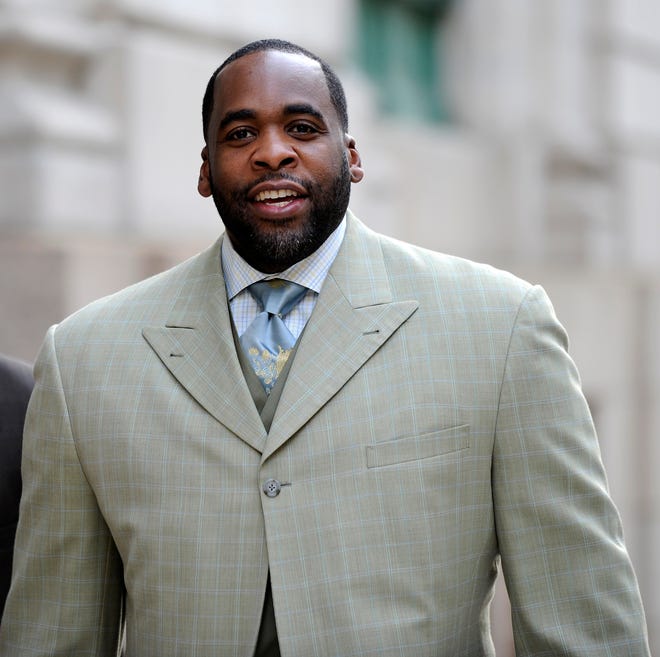President Donald Trump commuted the prison sentence of former Detroit Mayor Kwame Kilpatrick early Wednesday in one of his final acts, 16 years before Kilpatrick was to be released from prison for running a racketeering enterprise out of City Hall.
Kilpatrick was about seven years into his sentence for his role in a racketeering and bribery scheme while in public office. He and contractor Bobby Ferguson were convicted following a six-month trial when a federal jury found they turned City Hall into a “money-making machine,” squeezing millions of dollars out of government contracts and spending the money on luxury lifestyles.

“President Trump commuted the sentence of the former Mayor of Detroit, Kwame Malik Kilpatrick. This commutation is strongly supported by prominent members of the Detroit community,” the White House said in a statement.
“… Mr. Kilpatrick has served approximately 7 years in prison for his role in a racketeering and bribery scheme while he held public office. During his incarceration, Mr. Kilpatrick has taught public speaking classes and has led Bible Study groups with his fellow inmates.”
The move comes amid pardons to 73 people and 69 other commutations, the White House said.
Kilpatrick, 50, was sentenced in 2013 on two dozen counts of using his positions as mayor and state representative to carry out a decade-long criminal racket involving extortion, bribery, conspiracy and fraud. The 28-year sentence tied Ohio county politician Jimmy Dimora for the longest federal prison sentence for a corrupt public official in U.S. history.
The commutation Wednesday continued the epic narrative of Kilpatrick, whose political career as the young heir of a family political dynasty ended in scandal and a prison cell while the city he betrayed hurtled toward the largest municipal bankruptcy in U.S. history. The city’s finances were damaged, in part, by financial decisions made by Kilpatrick.
Kilpatrick’s plans for post-prison life were unclear early Wednesday.
“I think he’s going to take a real, long deep breath,” his lawyer Harold Gurewitz told The Detroit News. “I am really pleased for him and his family that he will be out of custody and with them.”
Kilpatrick’s life will not include holding elected office in Michigan anytime soon. Michigan law bars him from holding state or local office for 20 years after his conviction.
U.S. Attorney Matthew Schneider was critical of the commutation.
“Kwame Kilpatrick has earned every day he served in federal prison for the horrible crimes he committed against the people of Detroit,” Schneider said in a statement. “He is a notorious and unrepentant criminal. He remains convicted of 24 felonies. Kilpatrick has served only one quarter of the sentence that was very appropriately imposed.”
The announcement Wednesday ends speculation about whether Kilpatrick would be released early due to health problems and COVID-19, and amid a push from supporters, including businessman Peter Karmanos, who lobbied Trump, arguing Kilpatrick did nothing wrong or was unfairly punished.
“Kwame Kilpatrick is a person of great talent who still has much to contribute,” Detroit Mayor Mike Duggan said in a statement. “I know how close he is to his three sons and I could not be happier for them being together again. This is a decision President Trump got right.”
In May, the Ebony Foundation, a national nonprofit pushing for his release for months, sent out a press release touting Kilpatrick’s expected release. The announcement was backed by state Rep. Karen Whitsett, D-Detroit, who said she spoke with President Donald Trump about Kilpatrick’s release while the president was in Michigan and confirmed it herself with the White House.
Whitsett joined Trump at the White House last year for a meeting of COVID-19 survivors. Whitsett has praised the Republican president for having advocated for the use of the anti-malarial drug hydroxychloroquine, which she was prescribed after being diagnosed with COVID-19.
Reports in May indicated Kilpatrick, if released, would move in with his mother near Atlanta, Georgia. She bought a new $336,848 home 39 miles south of Atlanta in June 2019.
Former state Rep. Sherry Gay-Dagnogo of Detroit appealed to Trump in person for Kilpatrick’s release about a year ago. She said she found out in recent days that Kilpatrick would be on the commutation list.
Gay-Dagnogo reflected on her visit with Trump at the White House and putting her letter in the president’s hands.
“In that key moment, he heard me. He was receptive,” she said. “I looked in his eyes, we had an exchange …”
While there has been some pushback over the commutation, Gay-Dagnogo said it’s not a “disgrace,” and that “it’s God’s grace.”
“I see great things on the horizon for him and I’m glad today,” she said. “This is the capstone of criminal justice reform in Michigan and the country.”
Gay-Dagnogo said the outcome speaks to the numerous bipartisan criminal justice reform efforts that she and other legislators have taken part in.
“It’s a second chance certainly at redemption and to return to society and be a productive citizen,” she said. “Nobody is saying Kwame didn’t do wrong. He did commit a crime but the crime did not fit the time.”
Kilpatrick has been incarcerated at a low-security prison in Oakdale, Louisiana, where his release date had been listed as Jan. 18, 2037. Federal inmates receive reductions in their sentences for good conduct.
Ferguson, 52, the former Detroit mayor’s co-conspirator, did not receive a pardon. He is serving a 21-year sentence in an Ohio federal prison overrun earlier this year by COVID-19 and is not expected to be released until January 2031.
“That doesn’t sit well with me at all,” Ferguson lawyer Michael Rataj told The News on Wednesday. “Kilpatrick gets out and Bobby’s still stuck in prison? Tell me how that makes any sense.”
When Kilpatrick leaves prison, the former mayor will face massive financial problems.
He owes approximately $11.2 million to the city, Internal Revenue Service and others, including businessman Dan Gilbert.
Collecting will be difficult, if not impossible.
Kilpatrick said he was broke before being convicted of racketeering conspiracy in 2013. In 2018, he said he had 96 cents in his prison commissary account.
His financial problems contrasted sharply with evidence aired during the landmark corruption trial.
For months, as prosecutors presented 80 witnesses and thousands of documents, they painted a picture of Kilpatrick, his father Bernard Kilpatrick and Ferguson picking out winners and losers while awarding lucrative city contracts — as long as the winners were themselves.
Jurors saw forged documents, heard secretly recorded conversations and read text messages sent between the defendants. They heard that Kwame Kilpatrick and Ferguson talked about getting “us” money from city contracts and read messages that showed the defendants laughing at minority contractors and bullying others.
All told, prosecutors said Ferguson won $83 million in city work on tainted deals and became a source for a lifestyle that saw the former mayor spend $841,000 more than his city salary could have supported.
“One sad thing about this case is that a man with the charisma and ability of Mr. Kilpatrick chose to waste his talents on personal aggrandizement and enrichment when he had the potential to do so much for the city,” U.S. District Judge Nancy Edmunds told Kilpatrick before sentencing him to 28 years in prison.
Karen Dumas, a political strategist who served as executive director of community affairs and headed up an office overseeing arts, culture and tourism for the Kilpatrick administration, said the release was a good move.
“I’m not sure why Donald Trump did it but certainly join the ranks of people who are glad that he did,” Dumas said.
Although Kilpatrick can’t run for office, his voice still resonates with a lot of residents here, Dumas added.
“I don’t know how he is going to speak up, speak out or if he’s going to go some place (else) and let it all go,” she said. “Certainly, I do think his voice would resonate with a lot of Detroiters. Politics in Detroit are in his blood. I don’t think anybody ever doubted his love for or commitment to the city.”
On Wednesday, longtime Detroit political consultant Mario Morrow said many will be pleased with Kilpatrick’s release. While others, he said, will feel cheated.
“A lot of people felt that the sentence was steep and that 28 years was a bit much and it was just overkill, compared to other crimes comparable to what Mr. Kilpatrick had done,” he said. “On the flip side of that, there are quite a few people who are not going to be so happy because they felt that he took advantage of the city and he had a great career in front of him and just destroyed it on the backs of the people who needed him more than ever.”
Kilpatrick’s downfall, Morrow said, has had a lengthy, negative impact on his mayoral administration. Some of his close associates remain “unable to escape that shadow.”
Overall though, Morrow said, “Detroit has moved on and he recognizes that.”
Kilpatrick had potential and did a great deal of good as mayor, he said, but he strayed in the wrong direction, got caught and paid his dues.
“His ego and his over-the-top style of governing was just not acceptable to many citizens and residents,” Morrow said. “A lot of people hope that he starts a new beginning and sets an example for people who had a lot of faith and confidence in him that he has corrected his wrongs and is ready to be a true role model for redemption, recovery and starting over again.”
- Laker Men’s Basketball Handle Kuyper 88-55 - December 23, 2024
- MYWAY Sault Bridge Brawl & NEMWA Regional Results - February 22, 2024
- Crawford County Prosecutor clears State Trooper in the fatal shooting of man earlier this month - February 23, 2023




